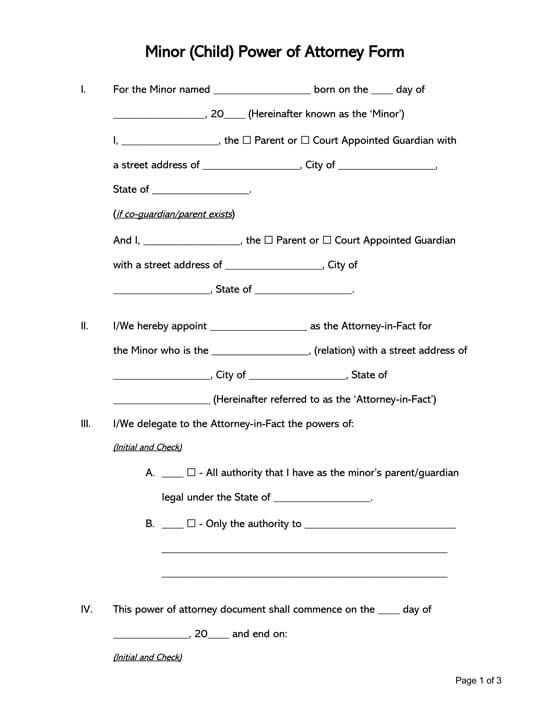This form is a legal instrument that empowers a parent to select a third party to take care of their child for a predefined duration of time. During this time, decisions concerning the child are delegated to a close relative or anyone who has a good relationship with the family or the child.
Formally, it is stated as:
Minor (Child) power of attorney forms are documents that give someone else the right to parent their child for a stipulated time, usually about a year or less.
Minor (child) power of attorney (POA) may also be known as:
Minor POA, ChilD POA, Medical POA, Power of Attorney for Minor, POA for Child Care and Custody, POA for a Child, Temporary Power of Attorney, Guardianship POA, or Grandparent POA.
Create a Power of Attorney Form
It is mainly used when the parent is too busy to do so on his own, has traveled abroad, or may not just fulfill his parental duties for whatever reason. The power grants formal permission, which makes it official and expedites the settlement of any emerging disputes.
Free Power of Attorney Form

POA Forms (by State)
Here are free customizable templates for each state:
Understanding Minor POA
The document in its basic shape and form delegates parental duties and responsibilities to a third party for a predefined duration of time. This is a document you have to look up to when you cannot discharge your parental duties and responsibilities for whatever reason. It is a ‘must-have’ as it makes such a delegation official and devoid of any doubts.
Minor vs. grandparent power of attorney
Often, grandparents provide some form of parental care for their grandchildren. This is what has led to grandparent POA, where the grandparents are preferred as the agents delegated temporarily to make parental decisions for the period that the child’s parents are unavailable.
In essence, a grandparent POA is a POA for a minor given to the grandparents.
Minor (child) POA forms usage
It is not meant for permanent authority but for a short-term use authorized by the parents (the Principal) when they are unavailable.
Some of such instances are:
- Overseas travels: If traveling overseas for a duration exceeding 6 months, you have to clearly delegate your parental duties to a third party, usually a relative. Obviously, you will not be able to perform such duties on your own hence the need to bring in someone else.
- Busy schedules: It could be that you are not traveling anywhere but you are too busy to handle your parental duties on your own. Yet again, you have to bring in someone to come through for you. The document will yet again serve to officially delegate the authority to the new person.
- Temporary separation: Other reasons may arise from time to time to separate you from your child. These reasons are varied, far, and wide. They include jail terms, surgeries, and vacations. Regardless of their nature or degree of severity, these reasons may demand that you give up your parental duties for some time.
- Incapacitation: Road accidents, crippling, and other severe impacts may incapacitate you to the extent that you are unable to perform your parental responsibilities as you normally would. When this happens, you will yet again have to pass on your duties to a third party, to the extent to which the incapacitation exists.
- Ill-health: Ill-health is also a chief cause of the inability to perform parental responsibilities. These illnesses are those that have some terminal character that takes too long to recover from. If you happen to suffer from such an illness, you will yet again have to invoke the assistance of another person to care for your children.
These and any other reasons would make the parents unavailable and require someone trustworthy to make decisions concerning their minor.
Agent- An Overview
Minor (child) POA legally authorises an agent to temporarily look after your children in your absence. When the parents, due to very necessary reasons, are incapacitated or unavailable to care for their child, the minor (child) power of attorney takes effect. It is granted by the parents to someone they find trustworthy while they are away.
The agent’s job
It is important to note that minor (child) POA forms do not transfer permanent custody; neither do they serve as documents that withdraw legal parental rights from the parents.
Its primary purpose is to authorize care for the minor and does not in any way relinquish financial responsibilities for the minor from the parents. A different document will be used if you have a need for your finances to be taken care of as well.
If what you need is someone to just grant consent for medical care in your absence, then a Minor Consent for Medical Treatment is used.
Agent’s parental rights
This form gives the agents similar rights to that of a custodial parent. In addition, the parents could be specific on the responsibilities to be carried out by the care provider they have chosen as well as regular everyday activities.
The parents could also include any of the following tasks to be added to the agent’s responsibilities:
- Make decisions pertaining to the minor’s healthcare, such as dental, mental, or overall medical treatment
- Register the minor in a learning institution or for extracurricular activities
- Take a trip with the child within the states. It should be noted that any trip outside of the states may demand some extra documents.
- Have access to the child’s academic records and contribute to any decision related to the child’s education.
In stating the parental rights of the agent, the parents could also outline the extent of the rights by mentioning the limits. That is, the minor (child) POA forms are likely to include things that the agent is not permitted to do.
For example, the parents may specify that the agent is not allowed to travel with the minor out of the country or impose their religious beliefs on the child.
Getting the POA for a Minor
Preparing these forms is not a difficult task. Below is a list of things you need to include and the information to guide you in making these forms.
The following information should be captured in your forms:
- Contact information of the parents and the agent(s)
- Start date or conditions that authorize the agent to start engaging the terms of the minor (child) power of attorney forms
- Name(s) of the minor(s) and birthdates
- Terms and contact for reaching parents while the minor (child) power of POA is engaged
Select someone trustworthy
The type of influence your child is around matters a lot at all times, especially in your absence. In choosing POA for your minor, careful consideration must be given in order to choose right. Be sure to choose someone you can trust to handle your child’s welfare in your absence.
Many times, people choose close relatives, grandparents, or siblings as the agents to be granted POA over their minor. That decision is absolutely left to the parents. But whoever you choose should be up for the responsibility. It should be someone that you have good knowledge of and not some ‘familiar stranger.’
There is also a need to discuss the responsibilities involved with the individual to make sure that is something they are willing to handle. Remember that this person will be responsible for the child’s feeding, exercise, and study habits if it is a school session. This person should be someone who can coordinate the child’s activities in a way that is acceptable and suitable to a good degree.
Questions to Ask Yourself Before Choosing a POA Agent for Your Minor:
Even when you have your options on who to grant POA for your child, it is necessary to ask yourself questions that will eliminate wrong choices and guide you in making the best choice.
Possible questions would be:
- Are they willing to handle the responsibilities? It’s not just about who you think is capable. Someone may meet all the requirements yet be unwilling to take up such tasks. Consider a person’s willingness before getting them to sign the minor (child) POA forms.
- Are they in a good state of health? Someone who is sick or mentally unstable may not be the right fit for the custody of your child. A sick person has little or no vigor to watch over a lively minor.
- Do they have the finances to take up an extra responsibility? If they don’t, is there a provision made for that?
- Will they be able to sustain your choice for the child’s school or extracurricular activities?
- Is there any legal entanglement or criminal record that might disqualify them from being agents for your minor (child) POA? If the court got involved, would they be found eligible?
- Do you trust that they would maintain the values you have brought up your child with? Would they disregard your parenting style or discipline your child in a way that you consent to?
Once these questions have been answered satisfactorily, you can make your choice and continue with the process of getting a power of attorney for your minor.
Start and end dates
After choosing the agent, make clear the duration for which it would be active. Choose the start date and termination date. According to the law of the states, there are maximum durations stipulated.
If you desire that the service extends beyond the stipulated allowance of the state law, the parent should follow the provisions made for that by the state.
Powers and responsibilities
For clarity, the child’s parents ought to specify the responsibilities required of the agent. It is expected that the extent of power the agent has over the child is clear and agreed on, especially if the child is to live with the agent for an extended timeframe, usually above a week.
It should state that the agent is allowed to pick the child from school and give the necessary attention to healthcare when the need arises.
Signing the form
After the terms, powers, and responsibilities have been laid out, this form will have to be signed to show mutual agreement by the parties involved.
The signatures are usually appended at the end of the minor (child) forms. Most times, it is required by the laws of the state that this authorization takes place in the presence of two witnesses or a notary public unrelated to the agent or parents of the minor.
Using the form
The form may be required every time there are matters related to the child that demands the agent’s action. It is expected that copies of these forms be made and available to be tendered when needed.
Time Period Table
The table below shows the longest duration permitted by the different states, after which it must be renewed to continue. It also shows the state laws guiding the creation of minor (child) POA forms.
| State | Laws | Maximum Period |
| Alabama | § 26-2A-7 | 1 year |
| Alaska | § 13-26-066(c) | 1 year |
| Arizona | ARS 14-5104 | 6 months |
| Arkansas | § 28-68-213 | Not mentioned |
| California | § 1510-1517 | Not mentioned |
| Colorado | § 15-14-105 | 12 months |
| Connecticut | Sec. 45a-622 | 1 year |
| Delaware | § 2320 to § 2328 | Not mentioned |
| Florida | § 744.3021 | Not mentioned |
| Georgia | § 19-9-124 | Not mentioned |
| Hawaii | §560:5-105 | 1 year |
| Idaho | § 15-5-104 | 6 months |
| Illinois | 755 ILCS 45 | Not mentioned |
| Indiana | § 29-3-9-1 | 1 year |
| Iowa | No laws | No laws |
| Kansas | § 38-2403(d)(2)(A) | 1 year |
| Kentucky | 27A.095 | Not mentioned |
| Louisiana | No laws | No laws |
| Maine | § 5-127 | 1 year |
| Maryland | No laws | No laws |
| Massachusetts | § 5-202 | Not mentioned |
| Michigan | Sec. 700.5103(1) | 180 days |
| Minnesota | § 257B.04 | Not mentioned |
| Mississippi | No laws | No laws |
| Missouri | § 475.602 | 1 year |
| Montana | § 72-5-103 | 6 months |
| Nebraska | Statute 30-2604 | 6 months |
| Nevada | NRS 159.0613 | 6 months |
| New Hampshire | No laws | No laws |
| New Jersey | Section 3B:12-74 | 6 months |
| New Mexico | Section 45-5-104 | 6 months |
| New York | FCT § 661 | Not mentioned |
| North Carolina | § 32A-28 to § 32A-34 | Not mentioned |
| North Dakota | § 30.1-27-07(3) | 6 months |
| Ohio | § 3109.52 to § 3109.61 | Not mentioned |
| Oklahoma | §10-700(A) | 1 year |
| Orgon | ORS 109.056(1) | 6 months |
| Pennsylvania | 11 Pa. Stat. § 2513 | Not mentioned |
| Rhode Island | § 33-15.1-14 | Not mentioned |
| South Carolina | Section 63-5-30 | Not mentioned |
| South Dakota | § 29A-5-201 | Not mentioned |
| Tennessee | § 34-6-302 | Not mentioned |
| Texas | Sec. 1104.052 | Not mentioned |
| Utah | § 75-5-103 | 6 months |
| Vermont | 14 VSA § 2659 | Not mentioned |
| Virginia | § 20-166(A) | 180 days |
| Washington | RCW 11.125.410 | Not mentioned |
| Washington DC. | § 21–2301 | Not mentioned |
| West Virginia | Chapter 44a, Article 1 | Not mentioned |
| Wisconsin | § 48.979(1)(am) | 1 year |
| Wyoming | Section 3-2-202 | Not mentioned |
Minor (Child) POA Forms Limitations
The limitations of forms are as follows:
- These forms do not give authorization to someone that does not legally qualify, based on court views, to act as an agent over a minor
- It doesn’t have the power to transfer custody of the child from the parents
- It doesn’t withdraw the legal parental rights from the parents. That is, the parents of the minor still have rights over their children and can terminate the contract with the agent whenever they choose to
- It is not within the authority of the agent to put the minor up for adoption
- Agents do not have the right to give the minor(s) in marriage
- Minor POA does not grant permanent custody of the child to the agent
Frequently Asked Questions
It is absolutely essential that the ‘power of attorney’ be notarized. This is the way to make it official and accepted widely. The document has to be notarized by both parents, ideally. In the event that the parents are divorced, only the one who has custody of the child has to do so.
Generally speaking, this document will last for one year only. In case you wish to delegate this responsibility for a duration longer than this, you will have to apply for guardianship. To put it differently: the scope of the document is such that it is only valid for a year or less.
YES, it can! Like any other power or document, it too may be cancelled for whatever reason. The processes involved in revoking this document varies from state to state. You have to be aware of the ones that govern the state you live in to do a good job.
This is not always mandatory. Unless you’re not sure what your state laws are for preparing a child POA, there won’t be any need for a lawyer
If you have to consult with a lawyer, it could cost you quite something, for consultation, services, and calls. It could even cost you more if you have to schedule a visit. However, you can take advantage of online platforms that provide such services at a discounted rate.
You may also have to pay some notary fees if your state requires that the document is notarized, as is the case of many states.












